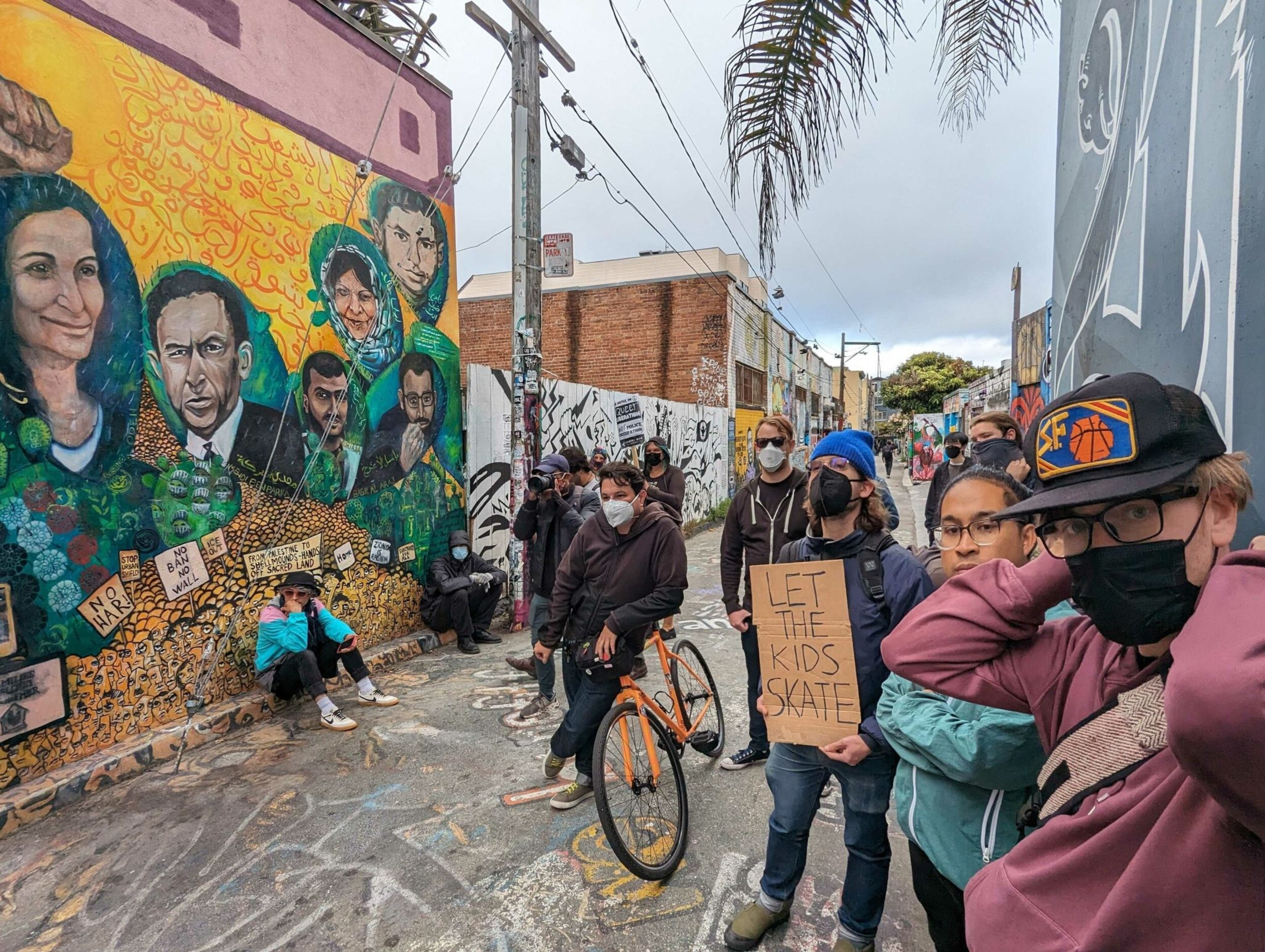Dozens of people gathered Sunday evening in San Francisco’s Mission District to protest the police department’s handling of an annual “hill bomb” skateboarder event near Dolores Park that ended with officers in riot gear arresting more than 100 people.
Eighty-one teenagers and 32 adults were taken into custody Saturday after what San Francisco Police Chief William Scott called “dangerous and unlawful behavior,” including vandalism damaging multiple San Francisco Municipal Transportation Agency vehicles.
Throughout the day Sunday, community representatives, elected officials and residents weighed in on Saturday’s events on social media. Some thanked police for their response to the gathering, the resulting damage and the process of reuniting detaining teens with their guardians, while others excoriated the officers’ response.
Protesters carried signs with slogans including “no justice no peace, queer liberation not police occupation” and “housing now, SFPD never.” Another slogan targeted San Francisco Supervisor Rafael Mandelman, whose district includes Dolores Park and who expressed approval of how officers responded Saturday. “Mandelman hates poor people,” those signs read.

Gary McCoy of the Harvey Milk LGBTQ Democratic Club was among those gathering Sunday.
“We were outraged with what we saw, what was happening last night,” McCoy said. “The way that our youth of San Francisco were approached and told to disperse by seeing police and military gear, riot gear, holding up weapons, pointing to weapons.

“That’s not how you handle the situation. It’s certainly not how you approach kids that are having a good time,” he continued. “It’s an event that happens every year. … Proper planning could’ve avoided that. Proper de-escalation could have avoided kids sitting on the ground out in the cold for six hours before they were finally released to their parents. It’s just unconscionable, the way that the folks were treated.”
READ MORE: SF Police Arrest 81 Teens, 32 Adults at Dolores Park ‘Hill Bomb’
The protest took place at Clarion Alley, a few hundred feet from the police’s Mission Station on Valencia Street near 17th Street. At one point, as an officer looked on from a balcony on the station, demonstrators chanted, “Quit your job!”
Around 7:30 p.m., after a lineup of speakers criticized police tactics in civil and less-than-civil language, some demonstrators swung back across Valencia to the alley to greet friends and share plans.

A demonstrator who identified herself as Ruby Louise said she believed skateboarding is criminalized “mainly because it’s like a free expression of kids, poor people and people of color. The cops will just use any excuse to arrest poor people, people of color and activists, pretty much anything.”
She said she did not know anyone who had been detained Saturday. “I show up to support people and let the cops know that they can’t get away with that shit,” she said.

Another protester, Timothy Gould, stood in Clarion Alley with a longboard and a thoughtful look on his face. He said he also didn’t know anyone who had been detained Saturday, but came out nonetheless after hearing about the protest on Instagram.
“The reason why I’m here and why all of us are here is because of what happened in Mission Dolores Park yesterday. The police were attacking skateboarders who were having their annual skateboard rally,” he said. “This gathering is for all of us.”

McCoy expressed irritation that police frequently say they are understaffed, yet apparently had the manpower to arrest so many people Saturday even as they struggle to respond to car break-ins and other incidents. He questioned why police don’t focus more energy on arresting drug dealers instead of skateboarding youth.
The city’s handling of 4/20—the longtime tradition of San Francisco tolerating public marijuana use on April 20 even before legalization—could serve as a possible model for how the city could have dealt with Saturday’s events, he added.
“Why aren’t our elected officials reaching out to parents and saying, ‘Hey, can we make this safe and how can we support this event and that that’s how it should be?’” McCoy said. “We sanctioned 4/20. … The city got in, and they supported that because it was something that was going to happen every year regardless of whether the police department thought it was OK or not.”
